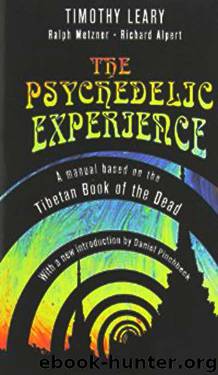The Psychedelic Experience: A Manual Based on the Tibetan Book of the Dead by Timothy Leary

Author:Timothy Leary
Language: eng
Format: mobi, pdf
Tags: drugs
ISBN: 9780806516523
Publisher: Citadel
Published: 2000-10-02T04:00:00+00:00
2. Planning a Session
In planning a session, the first question to be decided is "what is the goal?" Classic Hinduism suggest four possibilities:
Some Technical Comments about Psychedelic Sessions
1. For increased personal power, intellectual understanding, sharpened insight into self and culture, improvement of life situation, accelerated learning, professional growth.
2. For duty, help of others, providing care, rehabilitation, rebirth for fellow men.
3. For fun, sensuous enjoyment, aesthetic pleasure, interpersonal closeness, pure experience.
4. For transcendence, liberation from ego and space-time limits; attainment of mystical union.
This manual aims primarily at the latter goal - that of liberation-enlightenment. This emphasis does not preclude attainment of the other goals - in fact, it guarantees their attainment because illumination requires that the person be able to step out beyond game problems of personality, role, and professional status. The initiate can decide beforehand to devote the psychedelic experience to any of the four goals. The manual will be of assistance in any event.
If there are several people having a session together they should either agree collaboratively on a goal, or at least be aware of each other's goals. If the session is to be "programmed" then the participants should either agree on or design a program collaboratively, or they should agree to let one member of the group do the programming. Unexpected or undesired manipulations by one of the participants can easily "trap the other voyagers into paranoid Third Bardo delusions.
The voyager, especially in an individual session, may also wish to have either an extroverted or an introverted experience. In the extroverted transcendent experience, the self is ecstatically fused with external objects (e.g. flowers, or other people). In the introverted state, the self is ecstatically fused with internal life processes (lights, energy-waves, bodily events, biological forms, etc.). Of course, either the extroverted or the introverted state may be negative rather than positive, depending on the attitude of the voyager. Also it may be primarily conceptual or primarily emotional. The eight types of experience thus derived (four positive and four negative) have been described more fully in Visions 2 to 5 of the Second Bardo.
For the extroverted mystic experience one would bring to the session objects or symbols to guide the awareness in the desired direction. Candles, pictures,books, incense, music or recorded passages. An introverted mystic experience requires the elimination of all stimulation; no light, no sound, no smell, no movement.
The mode of communication with the other participants should also be agreed on beforehand. You may agree on certain signals, silently indicating companionship. You may arrange for physical contact -clasping hands, embracing. These means of communication should be pre-arranged to avoid game-misinterpretations that may develop during the heightened sensitivity of ego-transcendence.
3. Drugs and Dosages
A wide variety of chemicals and plants have psychedelic ("mind manifesting") effects. The most widely used substances are listed here together with dosages adequate for a normal adult of average size. The dosage to be taken depends, of course, on the goal of the session. Two figures are therefore given. The
Some Technical Comments about Psychedelic Sessions
first
Download
The Psychedelic Experience: A Manual Based on the Tibetan Book of the Dead by Timothy Leary.pdf
This site does not store any files on its server. We only index and link to content provided by other sites. Please contact the content providers to delete copyright contents if any and email us, we'll remove relevant links or contents immediately.
The Way of Zen by Alan W. Watts(6614)
Ego Is the Enemy by Ryan Holiday(5447)
The Art of Happiness by The Dalai Lama(4130)
The Book of Joy by Dalai Lama(3986)
Why Buddhism is True by Robert Wright(3452)
Spark Joy by Marie Kondo(3302)
Shift into Freedom by Loch Kelly(3199)
Happiness by Matthieu Ricard(3047)
A Monk's Guide to a Clean House and Mind by Shoukei Matsumoto(2915)
The Lost Art of Good Conversation by Sakyong Mipham(2654)
The Meaning of the Library by unknow(2571)
The Unfettered Mind: Writings from a Zen Master to a Master Swordsman by Takuan Soho(2311)
The Third Eye by T. Lobsang Rampa(2266)
Anthology by T J(2212)
Red Shambhala by Andrei Znamenski(2199)
The Diamond Cutter by Geshe Michael Roach(2060)
Thoughts Without A Thinker: Psychotherapy from a Buddhist Perspective by Epstein Mark(2025)
Twilight of Idols and Anti-Christ by Friedrich Nietzsche(1894)
Advice Not Given by Mark Epstein(1880)
